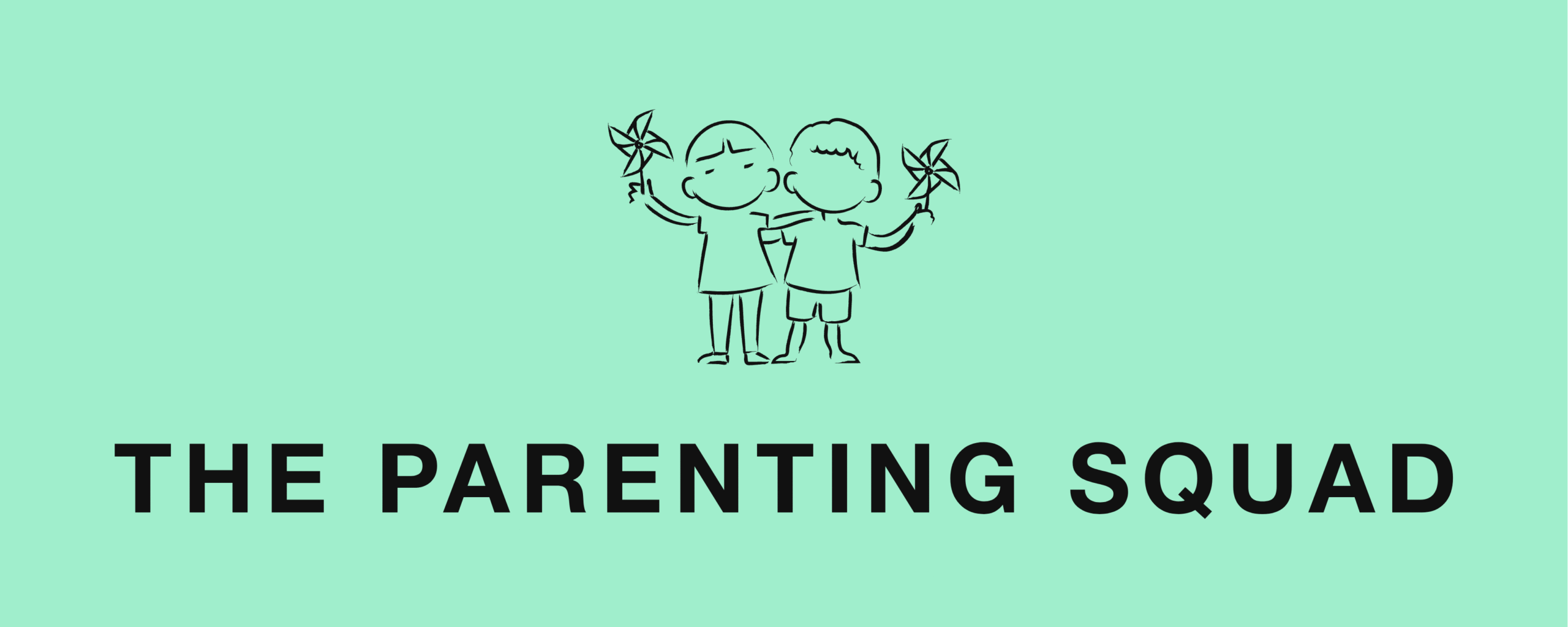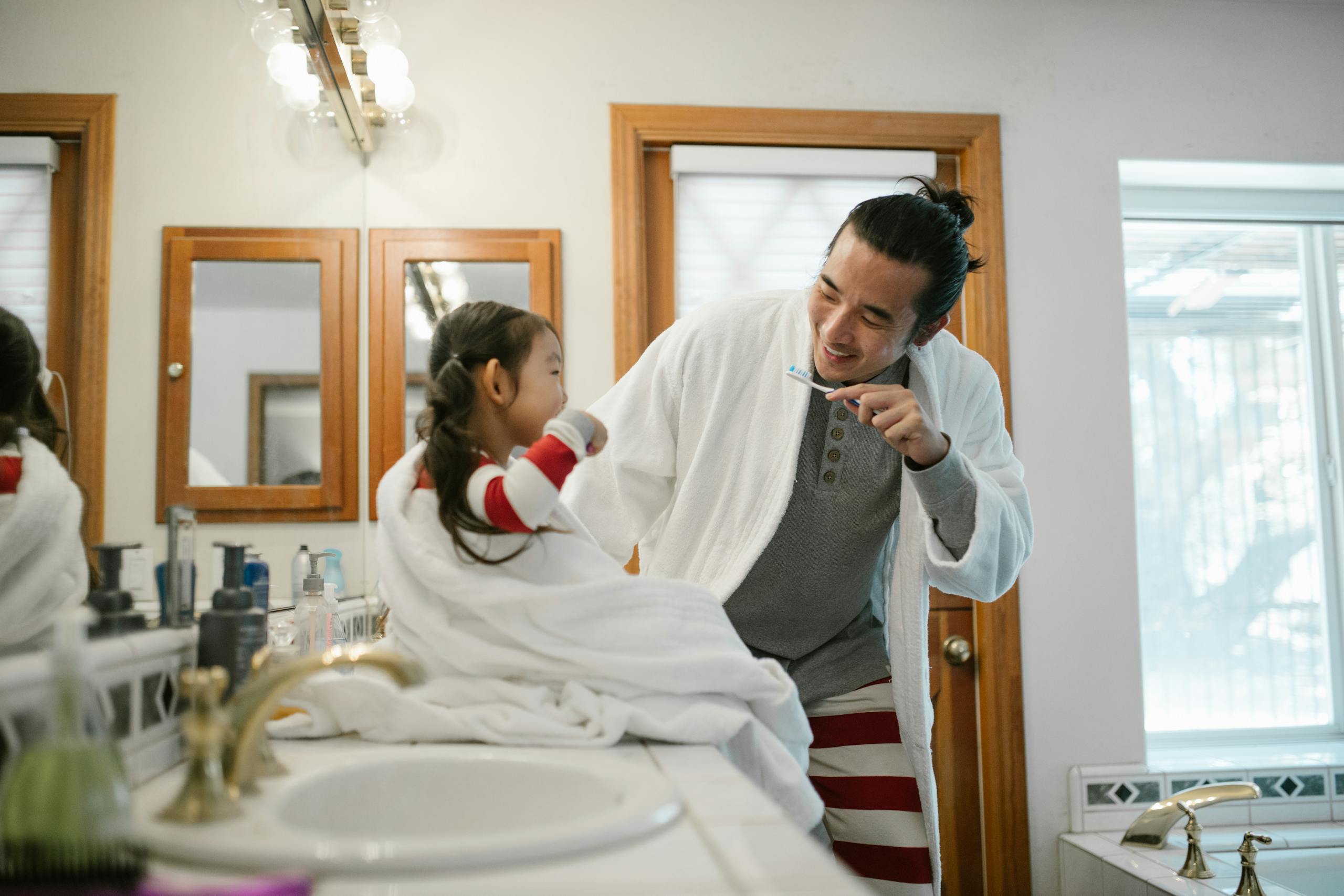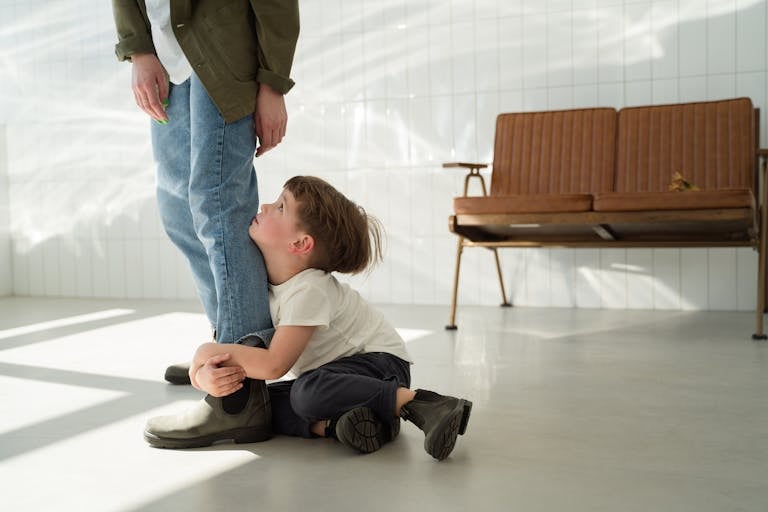7 Daily Parenting Tips to Turn Ordinary Parents into Superstars
Let me paint you a picture: It’s 7:30 AM, and you’re standing in your kitchen wearing yesterday’s shirt, holding a half-empty coffee mug, while your 5-year-old dramatically declares that their socks “feel too socky” and your teenager grunts something that might be “good morning” but could also be an ancient curse. Sound familiar?
Here’s the thing about parenting—some days you feel like you’ve figured it all out, serving balanced breakfasts and dispensing wisdom like a modern-day parenting guru. Other days, success looks like everyone is making it out the door with matching shoes (honestly, matching is optional). And let’s be real: parenting is a mess, both literally with toys and crumbs everywhere, and figuratively with unpredictable emotions and chaos.
But what if I told you that the difference between feeling like you’re barely surviving parenthood and thriving in it often comes down to a handful of simple, daily habits? These aren’t grand gestures or Pinterest-perfect moments, but small, consistent actions that add up over time to create something magical. Parenting is hard work, and it takes real effort and perseverance to show up for your family day after day.
Superstar parents aren’t born—they’re made through intentional daily choices. They know parenting isn’t about perfection; it’s about connection, consistency, and showing up authentically for their kids, even when (especially when) life is chaotic. Your effort into these daily habits can impact your child’s life and shape their well-being and ability to handle challenges.
Let’s look at the habits that turn ordinary parenting moments into extraordinary connections and see how the effort you put into building these habits makes a difference.
1. Start the Day with Connection
Before the chaos of the morning routine sweeps everyone away, superstar parents carve out a few precious moments for authentic connection. This isn’t about elaborate breakfast spreads or long heart-to-hearts (though if that’s your style, go for it!). It’s about intentionally starting each day by reminding your child that they matter to you—sometimes as simple as making eye contact during your morning greeting.
This connection might look like a warm hug before anyone checks their phone, sitting together for five minutes while eating breakfast, or simply asking, “What are you most excited about today?” The key is presence—putting down the mental to-do list and focusing entirely on your child for those moments, including noticing their eye color and making eye contact to reinforce your bond.
Children thrive on predictability and security, and when they start their day knowing they have your attention and affection, it sets a positive tone that carries through to school, friendships, and family interactions. Making this morning connection is the first step to a positive day. They head out into the world feeling seen and valued, which builds confidence and emotional resilience.
Here’s your actionable tip: Choose one small morning ritual that works for your family’s schedule. Maybe it’s a special goodbye handshake, a quick snuggle before getting dressed, or sharing one thing you’re grateful for. The magic happens when it becomes a consistent, expected part of your routine.
2. Practice Active Listening
We live in a world of constant distractions, but superstar parents know that one of the greatest gifts they can give their children is the experience of being truly heard. Active listening goes beyond simply hearing words—it’s about creating space for your child’s thoughts and feelings to be fully received and validated.
This means putting down your phone when your 8-year-old wants to tell you about their day. It means getting down to your toddler’s eye level when they’re trying to communicate something important to them (even if it’s about how their toy dinosaur is sad). It means resisting the urge to immediately jump into problem-solving mode when your teenager shares a challenge they’re facing. Active listening also helps children learn to behave in social situations as they observe and practice respectful communication and empathy.
Active listening builds trust and emotional intelligence. Children who feel heard are more likely to come to you with bigger issues as they grow. They learn that their thoughts and feelings matter, which helps them develop strong self-worth and communication skills.
Try this approach: When your child talks to you, repeat what you heard before responding. “It sounds like you’re frustrated that your friend didn’t want to play the game you suggested. That must have felt disappointing.” This simple technique shows them you’re genuinely listening and helps them feel understood. Through this process, children are taught valuable communication and listening skills by watching how you model these behaviors.
3. Consistent Discipline with Love
Consistent discipline can feel like holding your ground during a tiny person’s very persuasive argument about why bedtime should be “maybe tomorrow instead.” But superstar parents know that consistency isn’t about being rigid; it’s about being reliable and setting clear rules as part of consistent discipline. These rules and this predictability reduce conflict over time because children stop testing boundaries they know are firm.
The “with love” part is crucial. Discipline isn’t about punishment—it’s about teaching. When you need to enforce a boundary, do it calmly and with explanation. “I know you want to keep playing, but we agreed screen time ends at 7 PM. This helps you get enough sleep to have energy for tomorrow.” Consistent discipline encourages good behavior and helps children understand expectations.
Remember, you don’t have to be perfect. There will be days when you’re too tired to follow through consistently, and that’s okay. The goal is progress, not perfection. What matters is that your children generally know what to expect, feel secure in the structure you provide, and learn to make decisions within your set boundaries.
4. One-on-One Time Every Day
Even if you only have ten minutes, carving out individual time with each child creates a powerful connection and significantly improves behavior. This focused attention tells your child they’re valuable enough to deserve your undivided attention, which fills their emotional tank in ways that group activities can’t match.
For younger children, this might mean building blocks together, reading a favorite book, or having them “help” with a simple task while you chat. For older kids and teens, this could be a walk around the block, sitting together while they do homework, or even just checking in while you fold laundry together.
The key is to follow their lead during this time. Let your child choose the activity (within reason) and resist the urge to turn it into a teaching moment or opportunity to address behavioral issues. This is pure connection time—a chance for them to feel heard, seen, and enjoyed.
Children who receive regular one-on-one attention often display better behavior overall because their need for connection is being met proactively rather than through attention-seeking behaviors. Letting younger kids organize or put away their toys during this time can also foster responsibility and independence. It’s like making regular deposits in their emotional bank account.
5. Model the Behavior You Want to See
Children are great observers and natural mimics. They watch how you handle frustration, treat others, talk about yourself, and navigate challenges. Superstar parents recognize this teaching opportunity and use it intentionally. Both parents, including Dad, can model positive behavior by being kind, patient, and respectful.
Want your children to say “please” and “thank you”? Ensure you’re using those words with them and in front of them regularly. Hope they’ll learn to manage disappointment well. Let them see you take a deep breath and cope positively when plans don’t go as planned.
This doesn’t mean you have to be perfect—quite the opposite! Children benefit from seeing their parents handle mistakes with grace. When you lose your temper, a simple “I’m sorry I raised my voice. I was feeling frustrated, but that’s not okay. Let me try again” teaches them more about emotional regulation than pretending the moment never happened. And when your child is helpful, praise their actions specifically. This reinforces positive behavior and encourages them to be kind and constructive.
6. Family Rhythm
Routines might sound boring, but they’re the secret sauce that helps families run smoothly and children feel safe. They don’t have to be elaborate—simple, predictable rhythms create the structure that allows spontaneity and fun within safe boundaries.
Maybe it’s pancakes on Saturday morning, a family walk after dinner, or a bedtime routine that includes reading together. Perhaps it’s pizza and movie night on Fridays or Sunday morning, when everyone stays in PJs a little longer. These regular touchpoints become the foundation memories your children will carry into adulthood. Families also spend quality time together through these routines, strengthening their bond and creating shared experiences.
Family rhythms also reduce decision fatigue for parents. When certain things are “what we do,” less daily negotiation and mental energy is spent on logistics. Children thrive on this predictability—it helps them feel safe and know what to expect.
Create rhythms that work for your life. Consistency matters more than specific activities; these routines help build a nurturing relationship with your children over time.
7. Self-Care
Here comes the part where we talk about the oxygen mask analogy—because it’s true, even if you’ve heard it a thousand times. You can’t pour from an empty cup, and taking care of yourself isn’t selfish; being the parent your children need is necessary. Self-care for parents doesn’t have to mean spa days or expensive retreats (though if that’s available to you, great!). It might be taking a 10-minute walk alone, enjoying your morning coffee while it’s still hot, reading a few pages of a book, or calling a friend who makes you laugh. Remember, you don’t have to do everything perfectly—sometimes recognizing when to rest is just as important as any other task.
The key is recognizing that your well-being affects your ability to parent with patience, creativity, and joy. When you’re running on empty, everything feels harder—your kids’ normal behaviors feel more annoying, their needs feel more demanding, and your responses become more reactive than intentional.
Start small. Can you wake up 15 minutes earlier to sit quietly with your coffee? Can you ask your partner or a friend to watch the kids while you take a quick walk? Can you say no to one commitment this week to create space in your schedule?
Your kids benefit greatly when they see you treating yourself kindly and caring for your needs. You’re modeling self-respect and showing them that self-care is a regular, healthy part of life. Practicing self-care helps protect your mental and physical well-being so you can be there for your kids when they need you most.
Learn to Understand Your Child’s Development
Every child is on a journey, and understanding your child’s development is one of your most powerful tools as a parent. Positive parenting tips often start with tuning in to where your child is right now—emotionally, socially, and physically. Being present and responsive supports your child’s well-being and lays the foundation for a happy life.
Kids thrive when parents use positive parenting practices like encouraging, setting realistic expectations, and celebrating small wins. Remember, development isn’t a race. Some kids might be chatty and outgoing, while others take their time to warm up. By focusing on your child’s strengths and needs, you’re showing them they’re valued just as they are.
Teaching social skills—like sharing, empathy, and cooperation—can be woven into everyday moments. Model these behaviors yourself and use gentle guidance to help your child practice them. For example, when you thank your child for helping set the table or praise them for being kind to a sibling, you reinforce positive behavior and support their development.
Do Physical Activity Together
Getting active as a family isn’t just about burning off extra energy—it’s a powerful way to boost your child’s brain development and overall well-being. Kids learn best when their bodies move, and physical activity helps them focus, sleep better, and feel happier. Plus, it’s a great way to strengthen your family bond and create memories that last a lifetime.
You don’t need a gym membership or fancy equipment to get started. Walk around the neighbourhood, have a dance party in the living room, or play a quick game of tag in the backyard. The key is to make physical activity a regular and enjoyable part of your family’s life. When kids see their parents prioritising movement, they’re more likely to develop a positive attitude towards exercise and carry those healthy habits into adulthood.
Physical activity also supports healthy development by improving coordination, building strong muscles and bones, and boosting brain power. And let’s not forget the benefits for parents—moving together is a great way to relieve stress and recharge after a busy day.
Healthy Habits as a Family
Raising a healthy child starts with the habits you build together as a family. Positive parenting means modelling the behaviors you want to see—like choosing nutritious food, making time for exercise, and prioritising good sleep. When healthy choices are woven into your family’s daily life, kids learn that caring for themselves is what you do.
Start small. Maybe it’s cooking a new vegetable together, setting a consistent bedtime, or taking a few minutes each evening to wind down as a family. Use praise and encouragement to celebrate your child’s efforts, whether they try a new food or remember to brush their teeth without a reminder.
Healthy habits aren’t just about physical health; they support your child’s development, boost their mood, and help them feel their best. By focusing on positive parenting practices and making healthy living a family affair, you give your child the tools they need to thrive now and in the future.
Independence in Everyday Moments
One of the greatest gifts you can give your child is the confidence to make decisions and learn from their experiences. Fostering independence doesn’t mean stepping back completely—it means offering support and boundaries while encouraging your child to explore, try new things, and even make mistakes. Start by letting your child make age-appropriate choices like picking out their clothes, choosing what book to read at bedtime, or helping with household tasks. These everyday moments help your child develop essential life skills like problem solving, responsibility, and self-reliance.
When your child faces a challenge or makes a mistake, resist the urge to jump in and fix it immediately. Instead, offer guidance and encouragement: “I see you’re having trouble with that puzzle. What do you think you could try next?” This helps your child feel competent and trust in themselves.
Balancing support with independence isn’t always easy, but it’s key to your child’s well-being and development. By giving them space to make their own decisions and learn from the outcomes, you’re helping them develop the confidence and skills they’ll need for life.
Stay Informed and Keep Learning
Parenting doesn’t come with a manual, but staying informed and open to learning can make all the difference. Positive parenting is about adapting your parenting style as your child grows, seeking out new ideas, and being willing to try different parenting practices to support your child’s development and well-being.
Make it a habit to read articles, attend workshops, or connect with other parents to share experiences and advice. The more you learn, the better equipped you’ll be to handle challenges, make informed decisions, and nurture a strong, supportive relationship with your child.
Most importantly, trust yourself and your instincts. You know your child best, and by focusing on positive parenting practices and staying engaged, you’re giving your child the best possible foundation for a happy, healthy life.
Shaping Your Superstar Parent Foundation
These seven habits may seem simple, but their power lies in their consistency and cumulative effect over time. You don’t need to implement all of them at once—in fact, it’s better not to.
Choose one that resonates most with your current situation and focus on building that habit for a week or two before adding another. By doing so, you’ll raise children with strong values and a solid foundation for the future. Superstar parenting isn’t about being perfect; it’s about being intentional.
It’s about consistently showing up, being authentic, and creating an environment where your children feel safe, valued, and loved. These daily habits have a lasting impact on your child’s life and are crucial to their development. Some days, you’ll get all seven habits, and some days, you’ll struggle to get one, and that’s normal.
The great thing about habits is that they get easier with practice. What feels intentional and effortful becomes a natural part of your family’s rhythm. Your children won’t remember every perfect moment, but they will remember feeling loved, heard, and important to you. Of course, there will be difficulties in maintaining these habits, but it’s always worth it.
Looking for more ways to simplify parenting and have more meaningful moments with your children? Subscribe to our blog for weekly tips and strategies every parent can use to build stronger family connections and feel more confident in their parenting journey!







